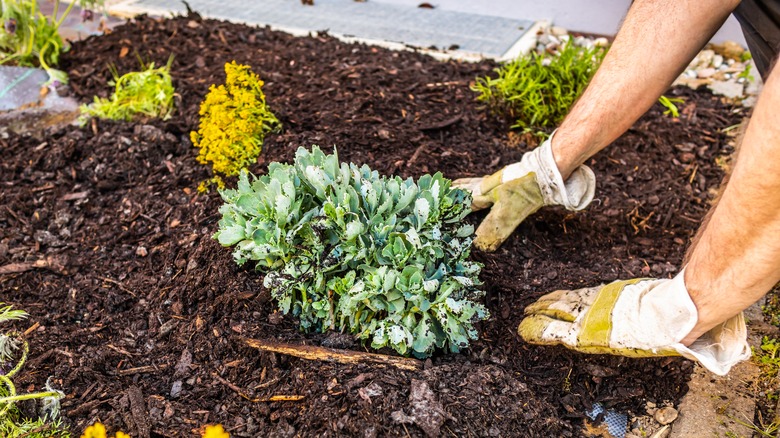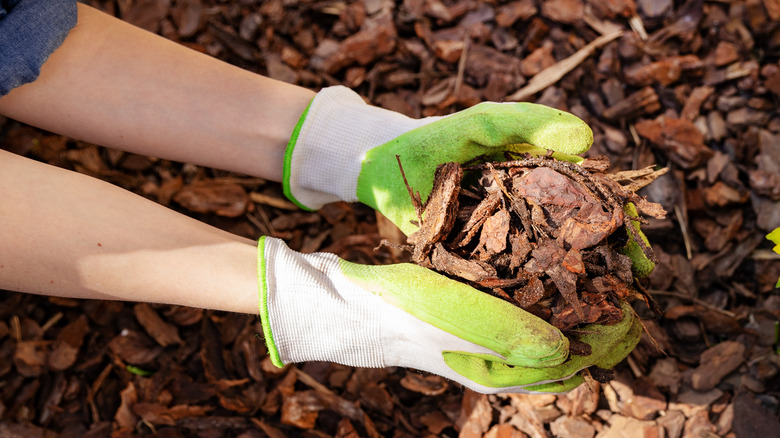Whether you’re a pro gardener or just starting out, preventing weeds can be an incredibly frustrating task. However, according to Dan Bailey, landscaping expert and the president of WikiLawn, certain types of mulch — in particular bark mulch — can make the job much easier. If you often struggle to combat weeds in your garden, then this specific mulch may be just what you need to solve the problem. Not only will it likely do a good job, but it may also help your garden in other ways, such as benefitting your soil and plants.
Of course, all of this talk certainly makes bark mulch appear to be the ideal choice, but what is it that makes this product such a high contender? Speaking exclusively to House Digest, Bailey explained exactly how mulch prevents weed growth: “Weed seeds need sunlight to thrive, and the bark mulch blocks [do] a wonderful job at blocking the weeds from getting any sunlight.”
By taking away this all-important factor from the weeds, mulch makes it harder for any trouble to start brewing in the depths of your garden.
Bark mulch leaves weeds in the darkness

When it comes to using bark mulch to ward off weeds in your garden, you need to first ensure that the area is weed-free. After this, you can apply your mulch as you normally would. However, with bark mulch, you will need anywhere between two to four inches of the material to cover the potentially pesky area in question, which should increase your chances of success. From there, it’s important to watch over the situation after you put the mulch down.
Dan Bailey highlighted to House Digest exactly how the bark mulch attacks the weeds on multiple levels, as long as it’s reapplied annually. “The best type of mulch to prevent weeds is bark mulch as it acts as an inhospitable barrier that stops weed seeds from coming into contact with nutrient-rich soil while also depriving them of sunlight. Bark mulch can prevent close to 90% of weeds from growing. Just as with other kinds of mulch, re-mulching only needs to take place once a year, but homeowners can apply new mulch a month or two in advance to be safe.”
Based on Bailey’s advice, even if you see a couple weeds spring through, it doesn’t necessarily mean that your mulch hasn’t done its job — you should only worry if it seems to make no difference at all. With that said, it turns out some products may be slightly better than others, and using the right bark mulch will make maintenance easier (and cheaper).
Look out for specific types of bark mulch

While bark mulch is effective, you should opt for a specific type to keep your costs (and effort) down over the long haul. As Dan Bailey explained, “When purchasing bark mulch, look for a type with larger chunks since those will take longer to decompose, which doesn’t require being replaced as often.”
If cost isn’t as much of an issue for you, then Bailey advised making sure you’re getting what you think you’re getting. “The type of bark mulch to use is a matter of preference, really, as they all provide the same benefits,” Bailey said. “Just be sure it’s bark mulch and not shredded wood.”
So, from now on, controlling weeds in your garden should be a breeze — simply put the mulch down, wait, and let it work its magic. Make sure to be tactical with your placement, as there is potential for it to move around during wetter seasons, but overall, this expert advice should prove ideal for fixing your weed problem.